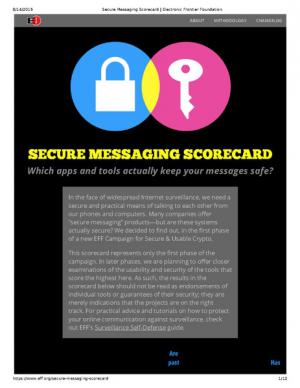EncryptionFBI unable to break 109 encrypted messages Texas terror attack suspect sent ahead of attack
FBI director James Comey told lawmakers this week that one of the suspects in the foiled terror attack in Garland, Texas, in May had exchanged 109 messages with sources in a “terrorist location” overseas ahead of the attack. U.S. intelligence and law enforcement agencies, however, have not been able to break into and read those messages because they were exchanged on devices equipped with end-to-end encryption software which, security services in the United States and Europe argue, make it impossible to monitor and track terrorists and criminals.

Scorecard for encryption effectiveness evaluation // Source: commons.wikimedia.org
FBI director James Comey told lawmakers this week that one of the suspects in the foiled terror attack in Garland, Texas, in May had exchanged 109 messages with sources in a “terrorist location” overseas ahead of the attack.
“In May, two terrorists attempted to kill a whole lot of people in Garland, Texas, and were stopped by the action of great local law enforcement,” Comey told the Senate Judiciary Committee Wednesday. “That morning, before one of those terrorists left to try to commit mass murder, he exchanged 109 messages with an overseas terrorist,” Comey continued. “We have no idea what he said because those messages were encrypted. To this day, I can’t tell you what he said with that terrorist 109 times the morning of that attack. That is a big problem. We have to grapple with it.”
U.S. intelligence and law enforcement agencies, however, have not been able to break into and read those messages because they were exchanged on devices equipped with end-to-end encryption software which, security services in the United States and Europe argue, make it impossible to monitor and track terrorists and criminals. These security services have called on legislatures in their countries to require the tech companies offering thee encrypted devices to have a backdoor available for law enforcement so that with the right provisions, such as a court order, the communications among terrorism suspects and criminals could be tracked.
The Blaze reports that Senator John Cornyn (R-Texas) met again with Comey Thursday during a closed-door, all-member briefing on the San Bernardino attack, told reporters Thursday that he had found the information about the Garland attack disturbing.
“One of the things that I shocked by was to learn that during the Garland shooting last year, there were 109 encrypted messages between one of the shooters and a terrorist location overseas, but because they were encrypted not even with a court order could the FBI get access to those messages,” Cornyn said.
Cornyn urged the senators to support his call for reducing the encryption capabilities with which tech companies are now equipping some of their devices.
“I’m limited what I can say at this point about Paris and about San Bernardino, but let me give you a recent example,” Comey said. “In May, when two terrorists attempted to kill a lot of people in Garland, Texas, and were stopped by the action of great local law enforcement again, that morning, before one of those terrorists left to try and commit mass murder, he exchanged 109 messages with an overseas terrorist.
“We have no idea what he said because those messages were encrypted. And to this day, I can’t tell you what he said with that terrorist 109 times the morning of that attack. That is a big problem. We have to grapple with it.”
Cornyn added that he thinks the encryption capabilities of devices should not be law-enforcement-proof. “It is not just a problem with terrorism,” he said. “It’s increasingly a factor in robbery, rape and murder cases too. And it has become part of terrorist trade craft. We value our privacy but we also value our security and public safety and those two things in this instance are on a collision course. “
Tech companies have fought hard against any legislation which would require them to equip encrypted devices with back doors for law enforcement, noting the risks to privacy involved by NSA-like metadata collection, as revealed by Edward Snowden.
“We value our privacy but we also value our security and public safety,” Cornyn said, “and those in this instance are on a collision course.
In his testimony, Comey said he appreciated the need for privacy. “We understand that encryption is a very important part of being secure on the Internet. We also all care about public safety,” Comey said. “We also all see a collision between those things and we see that encryption is getting in the way of our ability to have court orders effective to gather information we need in our most important work.”
“The government doesn’t want a back door,” he added. “The government hopes to get to a place where if a court issues an order to supply that information to the judge, and figures out on its own what’s the best way to do that, we shouldn’t be telling people how to operate their systems.”
He stressed that it is less of a technical issue than a business-model question.
“Lots of good people have designed their systems and devices so that judges’ orders cannot be complied with for reasons that I understand. I’m not questioning their motivations,” Comey said. “The question we have to ask is: Should they change their business model? That is a very, very hard question. Lots of implications to that. We have to wrestle with it because of what’s at stake.”
